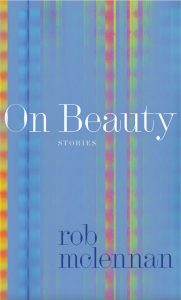A conventional story features a protagonist who is driven to take action to achieve an intense desire. Over the course of the narrative, the leading player faces difficult obstacles to their objective, forcing them to make choices that test and reveal their talents and flaws. Most conventional stories lead to a climax wherein the protagonist takes a decisive action that causes them to succeed or fail in their goal, and more importantly, exposes their character. The tale then ends.
On Beauty is less a collection of conventional stories and more an anthology of beautifully written character sketches. The author, rob mclennan (who writes his name in all lower case), has published 13 books of poetry, and the “stories” in this book reflect this aesthetic. Each chapter is a series of expressive feelings, ideas and images of a character’s circumstances.
In “The Garden,” David tends to the small garden on the balcony of his apartment, while longing after his neighbour as she tends to her own garden. “From his shaded perch, he could make out tattoos of small birds down the length of her left arm as she gathered ripe baby tomatoes.” But David doesn’t take any action whatsoever to pursue his yearning. He makes no choices that drive any plot and none of his actions reveal his character in any meaningful way. David’s journey is little more than a series of conceptions, impressions and reflections on his day-to-day life. Character is truly revealed when a person faces a challenge or a crisis that compels them to leave their comfort zone and do something out of their ordinary routine. Without this, nothing of the person’s true nature is revealed. The story is mundane, limited in meaning.
With that said, On Beauty does include stories where the protagonist takes decisive action. For instance, in “The Last Man on Earth,” a 12-year-old girl, Verity, tests the limits of her newly found independence when she rides the city bus home from school, getting off at stops farther and farther from her home. When a predatory passenger expresses his lewd appetites, Verity confronts the creep in a way that reveals the depth of her strength and courage. The result is deeply satisfying.
One can read the narratives in On Beauty for what they are: a collection of arresting and elegant character portraits written with visually evocative language. In “The names of things,” for instance, a terminally ill man catalogues his possessions in a way that ascribes meaning: “I name you, silver pocketwatch: handed down from my great-grandfather, from his time in Montreal.” The man’s journey ends with these affecting and poignant words: “I name you, tears of my mother…. I name you, morphine. I name you, breath.”
Andrew Torry is a curriculum designer in Calgary.
____________________________________________


